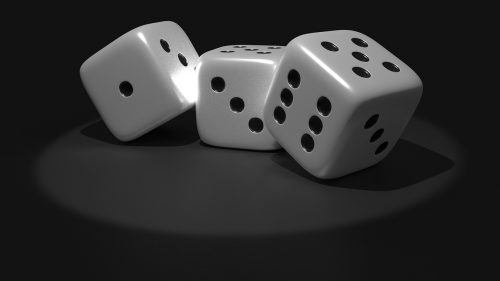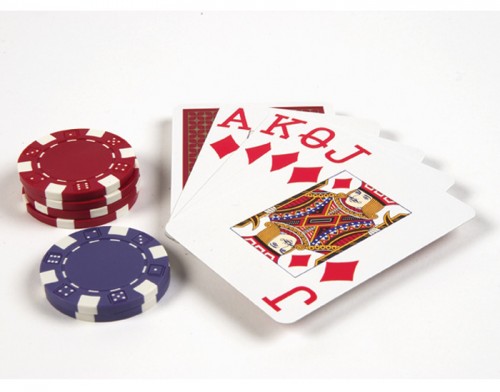I don’t watch reality TV. It’s not that I think it’s beneath me or anything, I just prefer to watch truly scripted shows (and I’m not getting that confused with many, many of the reality shows that clearly are scripted… you know what I mean). But there is one that I do watch and have watched since the first time it aired: Survivor.
Now I know what you’re saying… “that show sucks now”, “all they do is keep bringing back people who played before”, “there is nothing new to the show”, or maybe even “that show is still on?”.
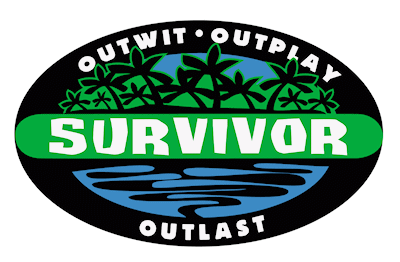
To you I say: I don’t care. Courtney and I love that damn show. We’ve watched pretty much every season with each other missing 1 whole episode (it didn’t record, it’s not our fault) over the 27 seasons. And I think the reason is because we like the game aspect of it as much as the “reality tv drama”. Those evenings when we start to go through the episode there are always frequent pauses as we discuss the strategy being used by Player A or Player B. And this isn’t just a matter of “Oh that was stupid, I hope they lose”. No, we analyze it like you might look at a chess board trying to figure out things 5, 10, 15 moves down the line. We’re trying to out-think the players (with the added benefit of doing from our comfortable couch and with the tv edits, but hey, we’re also not winning a million dollars).
The thing is our love of the show pretty much ends though with the show. We don’t search out fan-sites or strategy boards. And I’m normally pretty nerdy about stuff like that.
That being said we have come to our own conclusions about not only the show, but the strategy certain people use within the show. Now I’m not saying that any of them are sure-fire and if one of us got on the show we’d be a shoe-in for the million because there are tons of variables (heck there are 19 other players to start with), but some things you keep seeing time and time again and you have to wonder whether that contestant had ever viewed the show before.
So given that a new season started up last week – here are Courtney and John’s strategy for winning at Survivor (if any of you ever find yourself on the show perhaps these might help).
I believe that the game is really a sub-game of 4 levels. Different things happen at different levels and there are some overlap between moments and strategies one might employ, but in general I like to think about the game as the Early Game, Pre-Merge, Post-Merge, and the Final 3.
Early Game

For us the early game is pretty much from the moment you get the call that you are going to be in the game, but it probably should start even before then. This is the time to brush up on your boy scout skills (building shelter, fire, water, etc.). Why wouldn’t you try to come into the game with as much knowledge as possible? Now maybe they don’t tell them until very close to the time to begin, but I gotta think that people who have jobs aren’t in the position to just take off at a moment’s notice and would need some kind of heads-up.
Anyway, that Early Game lasts through about the 3rd Immunity challenge and corresponding Tribal Council. It is during this time that the majority of the big mistakes are made.
The Puzzle Gambit (better known as “I’m a liability in challenges”) – These include those who are normally older or just not as fit, but it is also can include the clumsy. In those first couple of tribal councils people are looking at who is going to cause them to lose the next challenge. You manage to screw up in one of these, you may never get a chance to prove yourself later on. Really, though, this means that you need to be aware of your strengths and weaknesses and try and position yourself to play to your strengths as best you can. If you can’t swim (well first, why are you out there) then you need to find a spot in the challenge where your running or strength can be shown.
And for God’s sake, don’t volunteer for the puzzle unless you are REALLY sure you are going to nail it. So many people run the Puzzle Gambit and then find that when they can’t perform (even when they have a 3 minute lead) the vote will quickly turn against them.
The Annoyance – These come in a few flavors. There is the talker, the loud-mouth, the know-it-all, and the lazy person. People are going to be hungry and they are going to be tired. They don’t want to be annoyed. Too many times there is this person who decides they aren’t going to change who they are for sake of the game… but who they are annoys the crap out of everyone on their tribe. Suddenly your torch is snuffed and you’re wondering where it all went wrong. Maybe you should have listened a little more.
The Alliance Junkie – This is the person who goes around and tries to make deals with every person on their tribe. And on one hand it seems to make sense. If you have an alliance with everyone, then your name can never be written down. The problem is that other people are comparing notes in those early days. They are the ones who see you talking on the side with Player B and soon enough they are going to figure out you’ve promised everyone final 3. That math just won’t add up and Jeff ends up saying your name one too many times.
The Leader – This actually can work to the player’s advantage so while there is risk, there can be great reward. However, most of the time this person puts the target square on their back and it backfires. But if they are likable or they have some star power (maybe they are a returning player on a tribe of newbies) then they have a shot to take complete control of their tribe and set up their Pre-Merge Game. It probably has failed as much as it has succeeded, but if you look back at past winners many of them are going to fall into this category.
Bringing up a name – At this point you should be happy whenever your name is not being brought up. Now is not the time to throw Leader under the bus because he said something bad to you and no one else. Now is the time to go with the flow. There is a saying in Baseball that you cannot win the Division in April, but you can lose it. In Survivor I think that means that you need to keep your head down and vote with however the rest are going… remember, there will be plenty of time later to make your move.
So in the Early Game what is the best strategy? I think it is being the Worker Bee. This is the person who never complains, who works just hard enough that no one thinks twice when they do need to take a break. Listen, you’re not pushing things to make others look bad (see The Annoyance above). You want to be a part of the crowd and blend in. You need time to see how things are shaking out and maneuver yourself into the proper alliance. And this is the other reason I think the Worker Bee is a good one, they are the type that get into an alliance with a group and are seen as “solid”. Again, you’re not trying to win the game, you’re just trying to survive to the…
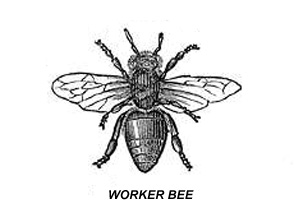
Pre-Merge
The game has been going on for at least 3 votes by this point and alliances have certainly been made. You’ve lost 1 or 2 or, lord forbid, 3 players. Hopefully you’ve found an alliance where you are comfortable with the people and can “trust” them.
The Numbers Game – This is more having to do with the challenges themselves. You need to find a way to win because, yes, you don’t want to go to tribal council, but more importantly, you need to have the majority when it comes to the merge. At worst you have to get things to even. So these are the votes where you make the big decisions of friendship vs. might or alliance vs. weakness. Choose wisely here because if you vote out the strongest guy because everyone hates him… he might have been the one to run just a little faster in that next challenge. These decisions many times are the undoing of a tribe as one bad choice rolls into another and suddenly you’ve lost the last 3 challenges.
Pecking Order – Don’t tell someone where they truly sit within your alliance. People need to be reassured that they are your best friend. That you and them are going the whole way. If you don’t reassure them eventually they’ll figure out that they are 5th best in your alliance and look to deal your fates for a better offer once you make the merge.
Strengthen Your Core – During this phase of the game you should be getting a decent feeling for who you can trust and who you can’t. Moments like revealing a hidden immunity idol to a teammate can help cement their relationship. I really feel that this is where you need to take the time to get to know the people in your alliance so that you build that bond with them. It is much harder to write someone’s name down who you genuinely like.
Post-Merge

So you made the Merge and feeling pretty good about yourself. You can already see the final votes where you win the million dollars, but not so fast! This is the point of the game where those old lines begin to blur a little bit. For every tribe that just systematically votes out the other tribe until they finally start fighting it out on their own, there is those tribes who have people flip and the blindsides begin to come fast and furious. You’re a King and then you’re a Pauper. What happened?
Threat – You won the first 2 individual challenges and now everyone sees you as a threat. I’m not saying not to win, but you always need to have an idea of how you are viewed in the game. If everyone is suddenly worried that they may not be able to beat you then they are going to vote you out on their first opportunity.
Mover and Shaker – This is the person who wants to shake up things with every vote. They love the high of the Blindside and want to relive it over and over again. When the rest of the people realize that you aren’t a person of your word then they are going to turn on you… before you can do it to them.
Reward Conundrum – You fought a good battle and won the immunity necklace and now you get to not only eat a feast, but also invite a couple of your friends. You choose A and B to come with you and those 4th and 5th members of your group suddenly realize the Pecking Order. When you get back you will find they may have flipped on you. So you need to have these talks with your group beforehand. Maybe a simple “I’ll take A & B if I win… if you win then take C & D” could go a long way to helping you remain in the game.
The Final 3
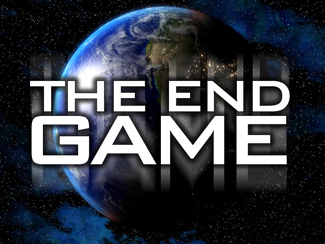
Despite the name, the Final 3 probably begins at about 5-7 people left. This is where you should be looking to see where you are in not only the Pecking Order, but who is going to get who’s vote. You allow yourself to dream of sitting at the end and who you think you can beat.
Make a Move/ Don’t Make a Move – Are you number 4 in your group? Are you sure that your partners want to sit with you at the end? This is where you need to not only do the math, but figure out who you can beat in the end. Too many times someone is so focused on just sitting at the end they delude themselves into thinking they can win and vote the few people out who they might have had a chance against. You need to weigh everything now and put yourself in the best position possible… and that may mean taking a chance for top 3 if a move succeeds, but then top 7 when it fails. Go big or go home!
Did you Make Enemies – If you are the Leader, then you definitely have and there is no getting around that. Your goal now is to remain true to your alliance and hope they feel the same way because the only way you are derailed is if they think they can’t beat you OR you flip on them and lose the jury’s respect (I think loyalty goes farther than almost anything else in the game. When you flip on people that helped get you to the end it doesn’t sit well with many people because you get cast as the Villain.
The Villain – You’ve betrayed people, you’ve lied and stolen from people, you are a snake and yet no one would vote you out. If you make it to the merge sometimes the Villain is the best play IF you are happy with 2nd place. People don’t like to be lied to, but more than that they would like to think the person getting the million dollars is a decent human being outside the game. If you didn’t convince them of at least that much…
The Right-Hand Man/ Coattails – “You just were riding his/her coattails” may be the most damning statement a jury member can say to one of the final 3. There is almost no coming back from that one. So what if you were in on every decision with your alliance, if the perception is that you just coasted along while everyone else took all the bullets, then you’re not getting the votes at the end either. People want you to have earned it and to have made the tough choices. The Coattails never has to do that (at least in their eyes).
Who wins? It seems the people who win are those who stick with their alliances. The ones who got a couple of lucky breaks. And the ones who make their moves at the correct time. But mostly, they are the ones who don’t beat themselves. They may stay under the radar at the beginning only to make a run towards the end. Or they could be the Lead Dog the whole time leaving very little in doubt.
Those aren’t even all of it. Heck, when I started this blog way above I wasn’t sure how much I would really have to say about this. Now I’m thinking I could have went on for at least double this (I will spare you from that… this time).
This one is for you, Courtney Regan McGuire. Thanks for talking silly tv show strategy with me all these years. I wouldn’t want to watch it with anyone else.
***
John McGuire
John McGuire is the author of the supernatural thriller The Dark That Follows, the steampunk comic The Gilded Age, and the novella There’s Something About Mac through the Amazon Kindle Worlds program.
His second novel, Hollow Empire, is now complete. The first episode is now FREE!
He also has a short story in the Beyond the Gate anthology, which is free on most platforms!
And has two shorts in the Machina Obscurum – A Collection of Small Shadows anthology! Check it out!
He can also be found at www.johnrmcguire.com.







